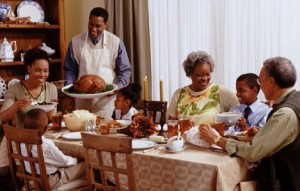 We all know that that Spring in the Midwest isn’t on a straight line from Winter toward Summer, but we’re on the cusp of a number of religious holidays that bring families together as we all move into warmer weather.
We all know that that Spring in the Midwest isn’t on a straight line from Winter toward Summer, but we’re on the cusp of a number of religious holidays that bring families together as we all move into warmer weather.
March 8 – Holi, the Hindu holiday honoring winter’s harvest and beginning of Spring
March 22 to April 21 – Ramadan, the Islamic holiday timed to the moon over Mecca
April 5 to April 13 – Passover, celebrating the Israeli’s liberation from Egypt
April 9 – Easter, which marks Christian’s celebration of Jesus’ resurrection
This isn’t about the holidays as much as some counsel on how to make this a holiday gathering and a wellness check for those who may be caregivers to older loved ones. When I speak with the adult children or partners of older loved ones, I encourage them to be observant for signs that their loved one’s ‘quality of life” may be compromised and to engage in conversation to get feedback on how their loved one is actually doing.
What should you look for?
- Household Clutter – You older loved one doesn’t have to be a hoarder to be at risk with the accumulated clutter of years of aging in place. Every year one in three adults over age 65 fall, and most of these falls are at home. Look for worn carpeting or scatter rugs that may be trip hazards. Or stacks of newspapers and magazines or wires that may be obstacles to walkways in the home.
- Pantry Stocked – While you may be able to tell if your older loved one is losing weight, whether they are eating well may be a bit more subtle. You will surely have occasion to have coffee in the kitchen, so use it as a chance to surreptitiously check that your loved one is well-provisioned.
- Lighting – Check on how well lit the key sites of most household accidents are: this is the bathroom and kitchen. While you’re at it, check for indoor/outdoor lighting at all entrances and also the stairs.
Take it a step further than simply asking the glossy “How are you doing?”
- How are you sleeping? – We all know that as we get older we simply need less sleep, but insomnia is another matter altogether. They may show the wear of too many sleepless nights, but the poor sleep could be a symptom of poor nutrition or even depression. When we talk to employers we often ask what keeps them awake at nights; not a bad start with your older loved one either. A pattern of poor sleep can lead to other health problems: blood pressure rises, blood vessels become inflamed, stroke risk increases and more. IF you do not ask, it may be you who loses sleep.
- Want Some Coffee? – I mention this as a way to get a current take on how well your loved one is eating. But ask about when they have coffee. Coffee during the early half of the day can impart all sorts of healthy benefits: reduced risk of stroke, diabetes and even some types of cancer. Taken to late in the day, however, we get back to sleep issues.
- What Have You Been Doing This Week? – What does your loved one do on a regular basis that keeps them engaged or keeps them ambulating? Time framing to “this week” helps you assess memory. They don’t have to wear a pedometer to track their activity levels, but it’s important that they get out and move. Walking about an hour a day has a marked impact on wellness by way of increasing caloric burn and helping with cardiovascular circulation. Sitting is the new smoking. It’s true that if they don’t use it, they’ll lose it.
- How are you…today? – I started by saying we have to move beyond the general questioning, but it is important to ask how your loved one is feeling…TODAY. Time framing again. The time frame is helpful in encouraging a mental pause to consider now…not just overall. Depression often has some very tangible tells – irritability, down countenance, negativity. And cardiac issues can have warning signs that can occur months before an emergency. For women the signs are less clear, so don’t assume that indigestion is about food or any other subtle cues are just a passing issue. Listen for what they may call “nothing;” it can be something.
If you’re a caregiver to an older loved one, enjoy family and the holiday, and take the conversational opportunity to make it a healthy holiday and year.
Charlotte Bishop is an Aging Life Care Advisor, Geriatric Care Manager and founder of, certified professionals who are geriatric advocates, resources, counselors and friends to older adults and their families in metropolitan Chicago. She also is the co-author of How Do I Know You? A Caregiver’s Lifesaver for Dealing with Dementia.





